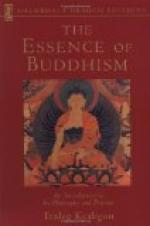Him I call indeed a Brahman who, though he be guilty of no offense, patiently endures reproaches, bonds, and stripes.—Dhammapada.
We will patiently suffer threats and blows at the hands of foolish men.—Saddharma-pundarika.
Who, though he be cursed by the world, yet cherishes no ill-will towards it.—Sammaparibbajaniya-sutta.
Persecutions and revilings, murders and numberless imprisonments, these hast thou suffered in thousands from the world, verily delighting in long-suffering.—Lalita Vistara.
At the end of life the soul goes forth alone; whereupon only our good deeds befriend us.—Fo-sho-hing-tsan-king.
The wrongdoer, devoid of rectitude, ... is full of anxiety when death arrives.—Mahaparinibbana-sutta.
He who has done what is right is free from fear.—Udanavarga.
No fear has any one of me; neither have I fear of any one: in my good-will to all I trust.—Introduction to the Jataka.
Our deeds, whether good or evil, ... follow us as shadows.—Fo-sho-hing-tsan-king.
He who now gives in charity
Shall surely reap where he
has given;
For whosoever piously bestows
a little water
Shall receive return like
the great ocean.
—Ta-chwang-yan-king-lun.
Covetous desire is the greatest (source of) sorrow. Appearing as a friend, in secret ’tis our enemy.—Fo-sho-hing-tsan-king.
That which is given in charity is rich in returns; therefore charity is a true friend; although it scatters it brings no remorse.—Fo-sho-hing-tsan-king.
He who stints the profit he has made, his wealth will soon be spent and lost.—Fo-sho-hing-tsan-king.
The (real) treasure is that laid up ... through charity and piety, temperance and self-control.... The treasure thus hid is secure, and passes not away. Though he leave the fleeting riches of the world, this a man carries with him—a treasure that no wrong of others, and no thief, can steal.—Nidhikanda-sutta.
Think of all sentient beings as thy children.—Tenets of the Soto Sect.
Though exalted, forget not the lowly.—Jitsu-go-kiyo.
Be kind to all that lives.—Fo-sho-hing-tsan-king.
Filled with compassion for all creatures.—Saddharma-pundarika.
Of all possessions, contentedness is the best by far.—Nagarjuna’s
“Friendly Epistle.”
A contented mind is always joyful.—Fo-sho-hing-tsan-king.
Let us then live happily, though we call nothing our own.—Dhammapada.
Not the whole world, ... the
ocean-girt earth,
With all the seas and the
hills that girdle it,
Would I wish to possess with
shame added thereto.
—Questions of King Milinda.
Let none be forgetful of his own duty for the sake
of
another’s.—Dhammapada.
The faults of others are easily seen; one’s own faults are difficult to see.—Udanavarga.




